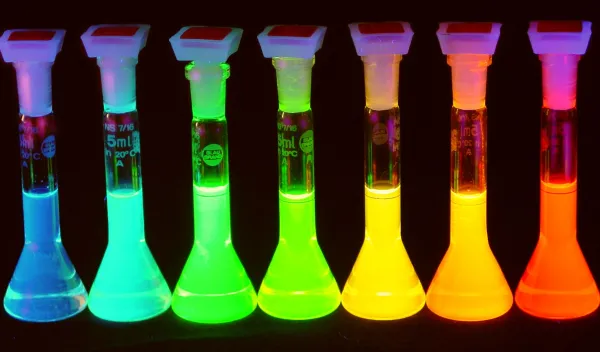
NSF congratulates laureates of the 2023 Nobel Prize in chemistry
The U.S. National Science Foundation congratulates Moungi G. Bawendi, Louis E. Brus and Alexei I. Ekimov on their 2023 Nobel Prize in chemistry. The laureates discovered quantum dots and a method for reliably producing them at a high quality. Quantum dots are extremely small semiconductor particles (a few nanometers in diameter) that can have unique optical properties potentially applicable for a wide range of uses, including optical devices, solar cells, biomedical imaging and quantum computing.
In the 1930s, physicists began theorizing the properties of synthetic materials so small in their dimensions that they could exhibit quantum properties. Fifty years later, in the early 1980s, Ekimov showed that theory was correct through his famous colored-glass experiments. Several years later, Brus created semiconductor nanocrystals that were stable and could be dispersed in solution. Then, in 1993, Bawendi developed a chemical method to produce, for the first time ever, quantum dots of superior semiconducting quality in quantities that opened the door to their use in many labs and for new and impactful technologies.
NSF is proud to have supported the research and early-career development of Bawendi and Brus.
In 1991, Bawendi received an NSF Presidential Young Investigator Award, which helped support his breakthrough discovery. The Presidential Young Investigators Program, which later became the NSF Faculty Early Career Development Program, recognizes early-career researchers for their exceptional leadership at the frontiers of scientific knowledge. Bawendi’s subsequent work on the synthesis of quantum dots was directly supported by another 10 NSF awards and was enabled by the use of an NSF-supported materials research center and chemical research facility.
NSF supported Brus’s research career with multiple awards as well. He, along with Bawendi, received NSF Graduate Research Fellowships in 1966 and 1982, respectively. In 2005, Brus received a research grant to investigate single-wall carbon nanotubes. In 2011, he received support through NSF’s Integrative Graduate Education and Research Traineeship program to train the next generation of scientists and engineers in the field through research experience and mentorship.
“Today, quantum dots are manufactured into technologies, products and services that are part of our everyday lives — from illuminating computer monitors and television screens to helping doctors map biological tissue," says NSF Director Sethuraman Panchanathan. "The success of these researchers is yet another example of how exploratory, fundamental research yields surprising discoveries that can be applied to enhance our quality of life."
NSF continues to support fundamental research on unexplained aspects and potential uses of quantum dots through research awards to institutions across the U.S.
To date, NSF has supported 67 Nobel Laureates in chemistry and 261 Nobel laureates across the science categories.
